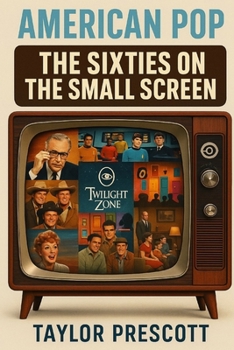American Pop-The 1960s on the Small Screen
In this new installment in the bestselling AMERICAN POP series, cultural historian Taylor Prescott delivers a captivating exploration of television's most transformative decade-the period when TV evolved from a novelty to America's dominant cultural force. From Walter Cronkite's emotional Kennedy assassination broadcast to the daring social commentary of "The Twilight Zone," from the global phenomenon of "Bonanza" to the revolutionary aesthetics of "Laugh-In," this book reveals how television both reflected and drove the extraordinary changes reshaping American society.
Prescott weaves together previously untold industry stories with insightful cultural analysis, showing how television:
Revolutionized presidential politics after the Kennedy-Nixon debatesBrought civil rights struggles directly into American living roomsCreated the first global media events through satellite technologyTransformed gender representation from Lucy Ricardo to Lieutenant UhuraEstablished visual templates that continue influencing today's mediaDrawing on extensive archival research and illuminating interviews with industry pioneers, "The Sixties on the Small Screen" explores how network executives, advertisers, writers, and performers navigated this tumultuous era, creating a medium that simultaneously unified Americans through shared viewing experiences while exposing the profound divisions in American society.
Neither a simplistic celebration nor a cynical critique, this volume in the acclaimed American Pop series offers a nuanced understanding of how television helped create the America we know today-for better and worse. Prescott demonstrates that we cannot fully understand the Sixties without understanding the glowing box that brought those years into American homes with unprecedented immediacy, creating a shared national experience that would never quite exist again.
Perfect for media studies scholars, Sixties enthusiasts, and anyone fascinated by how popular culture shapes our world, this richly illustrated history will change how you think about television's role in American life.
Related Subjects
History




